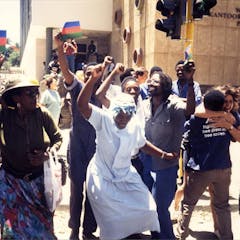
Articles on Namibia
Displaying 121 - 140 of 167 articles

For a military battle whose outcome is still hotly contested 30 years later, the impact was so remarkably clear – independence for Namibia, peace for Angola and the death knell for apartheid.

South Africa’s ANC and Namibia’s SWAPO, governing parties, enter crucial leadership elections this year, with presidents Zuma and Geingob both facing challenges.

Schools that have supportive strategies in place can offer buffers. They can promote positive outcomes – for pupils and teachers.

South Africa’s KwaZulu-Natal province is bearing the brunt of renewed rhino poaching efforts. This is a result of increased security and anti-poaching in the Kruger National Park.

The case of Zanzibar shows that, given certain political conditions, even low-income countries in Africa can introduce and pay for a universal pension programme.

Afrikaans is very much a black language. The apartheid government’s ploy to construct it as a “white language”, with a “white history”, denied the commonality of the language across race and class.

Namibia contributes a positive image to Africa in governance and other indicators. But the reality for most of the country’s 2.3 million people isn’t quite as rosy.

Young African penguins are following the usual cues to feeding grounds only to find that the sources of food in these places is no longer available. This is devastating for their numbers.

Opposition parties in sub-Saharan Africa struggle to prove themselves worthy to skeptical voters who, unlike in Western competitive systems, don’t trust them over former liberation movements.

Significant links connect racial science in colonial southern Africa with the holocaust of the European Jews. Colonial racial science also contributed to the 1994 genocide in Rwanda.

SADC’s credibility is at stake. Its lack of political will in acting decisively against despots is at odds with the African Union’s goal of promoting legitimate governance on the continent.

Representatives of Namibian communities affected by the 1904-1908 genocide have filed a class action against Germany in the US seeking reparations for atrocities committed by Imperial Germany

Very few African universities offer postgraduate degrees in astronomy. This gap in knowledge and training can be addressed through international partnerships and collaboration.

The legitimacy and credibility of those in power has been eroded by bad governance, patronage and the obsession to claim an exclusive agency representing the people.

A project that aims to change the fate of accident victims in developing countries.

To get Nelson Mandela released and save Namibia’s independence elections, Thatcher proposed a massive aid programme.

A deal intended to help southern African countries develop could instead turn them into an EU dumping ground for cheap goods.

Ironically the campaign to withdraw from the ICC was mainly initiated by the very same governments and heads of state that had earlier referred cases to the ICC when it suited their own interests.

As life gets faster and working hours get longer, it’s tempting to think the Sandman is paying us ever shorter visits.

To improve, African countries need to find a balance between political and economic matters. This is where leadership becomes particularly important. But this is currently lacking on the continent.
